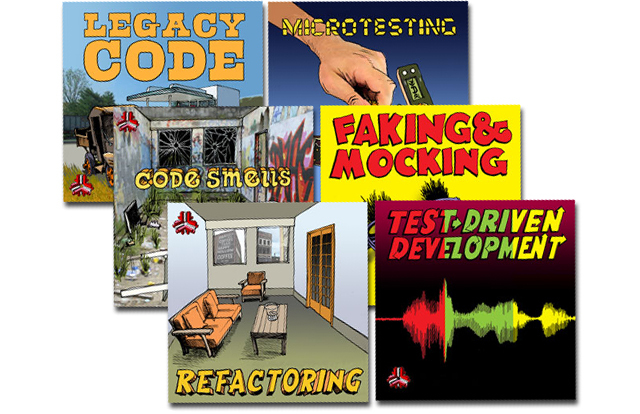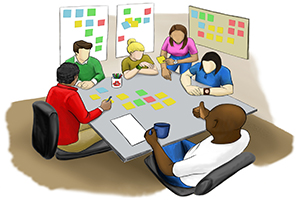XP War is a fast-paced game that resembles the old card game, War.
The game is played with either all of the solution cards or problem cards from your deck of eXtreme Programming Playing Cards. Players compete to win the highest number of solutions or problems by comparing their values.
This game helps you learn about:
- solutions to problems on extreme programming projects
- the power and importance of these solutions and problems
- which solutions and problems are more important or powerful than others
XP War is appropriate for
- people or teams learning XP or thinking about using it
- people or teams that are doing XP and want to get better at it
- XP coaches or coaches-in-training
Rules
You can play this game with either all of the solution cards or all of the problem cards. If you play with the solution cards, you’ll be comparing them by asking the question, “which is the most important solution?” If you play with the problem cards, you’ll be asking the question, “Which is the worst problem?”
The rules that follow assume you’re using the solution cards.
For 4 players, all of the solution cards are dealt face down into four equal stacks (or three stacks for three players, and so forth). Each player turns over her top card and a war begins. The players must decide which solution is more important on a project. If player A’s solution is more important, player A takes both solution cards, adds them to the bottom of her stack, and a new showdown begins.
If both solution cards are deemed to be of equal importance, each player turns over their next card, compares the solutions, and the player with the more important solution takes all the cards and adds them to the bottom of his stack. If the two cards facing up are once again of equal value there is another war until a winner is determined. Regular play then resumes until one player wins all her opponent’s cards.
A player drops out when she has lost all of her cards and play continues until one player wins all of the cards.
For individuals or teams who are new to XP, it helps to have the XP literature by your side as you play.
Players
XP War is typically played with four players, although the game can be played with two or more. All players should begin the game with the same number of cards in their stack.
Time
You can play this game for 20 minutes or several hours. If one player wants to win all of the cards, expect to play for about an hour (assuming you don’t argue too much).
A Simulation of XP War
The following simulation is with two players, though we prefer to play this game for 4 players (and if you have nearly 8 people, just pair up to form 4 teams).
Judy and Harold extract all of the solution cards from their deck of eXtreme Programming Playing Cards (i.e every card with an “S” in the middle).
Judy deals the solution cards face down between Harold and herself. Each player’s stack of solution cards remains face down.
Play begins as Judy and Harold play the top card in their stack. Judy’s solution card says “Quick, Daily Standup Meetings.” Harold’s card says “Split A Story.”
Judy: "Well, Harold, I think a lot of important issues get resolved during stand-up meetings, so while splitting up a story is important, I think conducting regular stand-up meetings is even more important on a project."
Harold agrees, so Judy takes both cards and adds them to the bottom of her stack.
A new war begins. Judy lays the top card from her stack face up. Harold does the same. Judy’s card “Continuous Integration.” Harold’s card says “Refactor Mecilessly.”
Harold: "Well, well, well, Judy. Merciless refactoring sure is important if a team is not going to get bogged down by bloated, poorly-designed code. I think this beats your integration card."
Judy: "Not so fast, Harold. If a team doesn't integrate early and often, they will experience slow downs in their velocity, continuous refactorings will make integration even harder to do, and this will all lead to bottlenecks at the integration machine, since integrations will take longer than they need to. I think this solution is as important as your solution card."
Harold: "Okay, you have a point. I'd say it is close, too close for us to call, so we can do another war."
Judy and Harold leave the two cards on the table and throw down new cards. Judy’s card “Continuous Learning.” Harold’s card says “Programmers Help Pairs Within Earshot.”
Judy: "Let's see, I happen to have read Joshua Kerievsky's XP 2001 paper on Continuous Learning which makes it abundantly clear that if a team strives to continuously improve during and at the end of every iteration, they will go faster, do better work and have more fun as a team. Overhearing a problem in an XP environment is great and can only happen because people don't sit in separate cubes, but it doesn't compare with a team practicing continuous learning. Soooo, I guess I'll take all the cards."
Harold: "I wish I could refute that argument Judy, but your solution is more important that mine."
So Judy takes all 4 cards on the table and adds them to the bottom of her stack.
Play continues until either Judy or Harold have to quit, or one of them wins all of the solution cards.
Variations of Play
You can play XP War in a variety of ways:
- Problem Cards: Play a version of this game with all of the problem cards. The winner of a war is the player holding the problem card that is considered to pose the greater threat to a project.
- Winnings Stack: Play a version of this game in which players keep the cards they’ve won in a separate winnings stack. When the game ends, whoever has the most cards in their winnings stack is the game winner.
- Tell us about your variation.
Feedback
We’d love to hear your feedback about this game.




